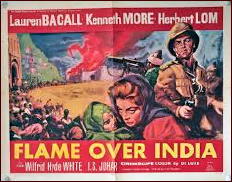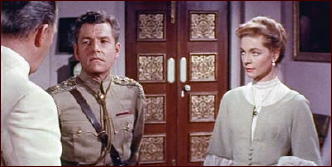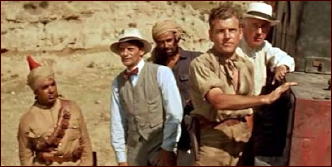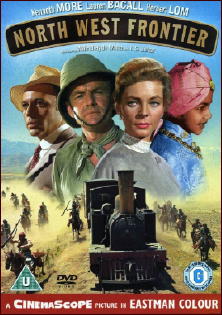Sat 8 Feb 2014
A Movie Review by David Vineyard: NORTH WEST FRONTIER (1959).
Posted by Steve under Action Adventure movies , Reviews[6] Comments

NORTH WEST FRONTIER. The Rank Organisation, UK, 1959. US title: Flame Over India. Kenneth More, Lauren Bacall, Herbert Lom, Wilfrid Hyde-White, I. S. Johar, Ian Hunter. Directed by J. Lee Thompson.
Set your movie on a train and you already have my attention. Make one of the classic action films of all time with a first rate cast and superb tension from an expert at directing action and suspense (Cape Fear, The Guns of Navarone) *, and you have a first rate film shot in gorgeous color and on location.
Kenneth More is a British officer in command of a small troop of Sikhs in an isolated kingdom on India’s rugged outlaw ridden northwest frontier. A rebellion has broken out against the local Maharajah, and the British consul (Ian Hunter) wants More to get a group of Europeans trapped in the palace out safely — and along with them, the Maharajah’s young son and his American tutor (Lauren Bacall).
Among the European’s are a Dutch journalist with Indian blood (Lom), a garrulous older man (Hyde-White), a gun runner, and a redoubtable older Englishwoman. Their only means of escape an aging train engine, her Indian driver (I. S. Johar), one coal car, a flat car, and a passenger car.
Film goers used to today’s frenetically paced films will find the fact this one bothers to stop to develop character, build an intriguing relationship between professional soldier More and doubting American Bacall, and establish the other characters as well, a bit slow, but even they will be impressed by the action sequences beginning with the breakout from the surrounded palace in the train and including running gun fights, a perilously damaged bridge across a precipitous gorge, and a final full out assault by hordes of tribesmen on horseback while a traitor in their midst pins the passengers and soldiers down with a .50 caliber machine gun he has taken over.
More and Bacall have real spark together, Lom provides both menace and depth, and Hyde White is his usual charming self, but the real surprise of the film is Johar, who takes what could be a stereotyped local and gives him both real courage, strength, determination, and character. Both he, and through him the aging train engine he loves, become compelling characters in the film.

He takes what could be an embarrassing and potentially racist stereotype and gives him dignity and humanity.
The film isn’t an old fashioned paean to the Raj though, in the Gunga Din or Lives of the Bengal Lancers tradition. It asks questions, and while it is unstinting in its admiration for More’s professional soldier, it, and Bacall’s character, bring up the question of what right he or the British Empire has there. And More is no superman, but a tough wry professional, limited perhaps in his devotion to his duty, but also human, canny, good humored, and courageous.
This is a stunningly photographed film with an intelligent script and a real sense of the time and the place.
One scene in particular in a crowded engine room while a rickety and dangerously open donkey engine runs the pumps to water the train’s engine while Lom is left alone with the prince is splendidly shot and guaranteed to get you on the edge of your seat.

Within the confines of an action packed thriller it takes on questions of race, fanaticism, duty, freedom, and individual courage without ever faltering in the line of suspense and action or brushing the questions it asks off with simple answers.
In relation to what has been happening in the Middle East in recent years it may be as pertinent as ever.
Granted, despite the best efforts of all concerned there isn’t a lot of doubt who the villain proves to be, but that said, he is given both dignity and depth. You may be pulling for him to fail and cheering for the heroes to escape, but you can’t ignore his points or his own plight. All the major characters are presented as real humans rising or failing to rise in a crisis, not as mere plot points.
And the film manages to end on a nice note of irony — a recognition that an era was coming to an end and a new world being born. It’s the perfect coda to a first class adventure film and a fine study of people caught in desperate circumstances and showing grace under pressure.
* Sadly Thompson did not live up to his early films and ended up hacking out some tired and unimpressive Charles Bronson films late in his career.

February 8th, 2014 at 11:46 pm
Other than the fact I am not at all interested in the villain, his rights or point of view, the film is superb, and Bacall with More, make an attractive pair. J. Lee Thompson directed his share of time wasting sequels to Death Wish, but before that and aside his big breakout pictures, delivered fine and sensitive work with Before Winter Comes, The Good Companions and best of all, Tiger Bay, putting the young and captivating Hayley Mills front and center.
February 9th, 2014 at 1:03 am
Further thought: I. S. Johar is always a joy to see. Remember him fondly from his loving performance with Stewart Granger in Harry Black.
February 10th, 2014 at 7:08 pm
Barry,
I’m another fan of Johar in HARRY BLACK, a better movie than critics admit, and a damn good book by David Walker (WEE GEORDIE). Johar brought class to anything he was in. George MacDonald Fraser wrote glowingly of his performance here in his book on historical movies.
I was just commenting that it’s unusual for a film about the Raj to bother to try to give some justification to the villain, and it helps the suspense in this one. Too often in these the villain is a villain just because he’s a villain.
TIGER BAY is a great film, and I’ve been trying to find THE GOOD COMPANIONS for years.
February 10th, 2014 at 9:00 pm
David, Politically you may have gathered I’ve drawn a line in the sand. Nothing wishy-washy, although for the War Between The States I have no tolerance for the conduct of either side. As for George MacDonald Fraser, he sent me an autographed copy of the 2nd Edition — which was gussied up with a ne photograph of Louis Hayward. I thought it first class. The Good Companion with Gielguld and Jessie Matthews is available, but the Thompson’s 1956 version — must be coming at some point. Fraser dedicated Royal Flash, to among others, Hayward, Flynn, Doug, Jr. , Tyrone Power. We had a lengthy correspondence that lasted until his death. An apparently lovely man. About 12 years ago he called, out of the blue, as he’d lost my ne address and was concerned. A pen pal, but a great one.
February 11th, 2014 at 12:39 am
Apparently a British edition of the 1957 film version. Seems only available in the UK.
February 11th, 2014 at 1:20 pm
It’s available from Amazon and other sources under its US title FLAME OVER INDIA on both DVD and Blu-Ray. A used copy can be obtained for around $6. I may give it a try. I knew nothing about this movie until I read David’s review, and now I’m intrigued.